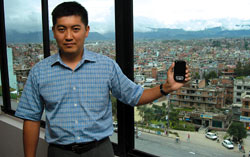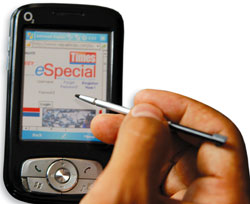|
|
| The technology allows Mero Mobile users to browse the Nepali Times eSpecial website, among others. |
On the top floor of Spice Nepal's new office block at Krishna Tower in Baneswor, CEO Damir Karassayev looks down at bustling Kathmandu, and tells visiting reporters: "Ask me any question you like."
Then he hesitates and adds: "Except about the SPA and the Maoists."
The Kazakh head of Nepal's first private GSM service provider is literally moving up in the world and has reason to be confident. Since September, Spice Nepal's Mero Mobile has signed up 125,000 subscribers in Kathmandu, Pokhara and Hetauda.
Engineers are working to hook up Butwal, Biratnagar, Bharatpur, Janakapur, Biratnagar and Dharan and the company hopes to reach 500,000 subcribers by the end of the year.
When Spice Nepal started in 2005, skeptics called it a fly-by-night operation-pointing out its overseas investors and royal connections. The company is owned by Group Visor, a Kazakh company and other investors include Russian-Nepali businessman Upendra Mahato and the Indian Modi group. Mahato has also bought the 17 percent stake of King Gyanendra's son-in-law Raj Bahadur Singh.
But it looks like Spice is here to stay. Last year it signed a $29 million contract with Siemens Communications to build a nationwide GSM network with base stations, switches and microwave technology. By 2008, the network will be capable of handling one million subscribers.
 |
| WAP: Spice Nepal CEO Damir Karassayev poses with his GPRS-equipped phone at his office on the top floor of Krishna Tower in baneswor on Tuesday. |
Indeed, Nepal's phone penetration rate is one percent and the reason it is so low has nothing to do with affordability. The state monopoly is just not able to provide phone lines even to people willing to pay for it. Karassayev believes even this demand will rise as mobile telephony takes over and there are economies of scale.
With the cost of handsets now less than Rs 4,000 Spice hopes to add 250,000 new subscribers every year as its network expands. The company is also marketing aggressively with no trunk tariffs on city-to-city calls, one hour free calls within the network and no-charge for incoming even from other networks. Spice has already brought in GPRS, and Karassayev demonstrates by logging on to Nepali Times eSpecial with his sleek O2 handset. By August, Spice will also introduce MMS which allows subscribers to send images, video and download personalised ringtones.
Although Mero-to-Mero calls are cheap and convenient, subscribers have encountered difficulty connecting from other networks like UTL and NTC. The reason for this appears to be NTC opening only a limited number of E1 interconnect nodes to other subscribers.
Also, many NTC subscribers have been reluctant to switch to Mero Mobile because they will have to change their numbers. Karassayev isn't worried about this. "Nepalis have a choice, they can switch to Mero Mobile or they can stay with NTC. Besides as more people use mobile phones they make the pie bigger and everyone benefits," he says.
Spice is also testing its procedures to introduce roaming in the next month but expects more inbound users than Nepalis demanding roaming services when they travel abroad. Outbound roaming also requires special Rastra Bank permission since it means a hard currency outflow.
Asked where else Spice is hoping to expand, Karassayev looks out at the hills on the other side of the Valley and says: "We will bring our service wherever there is demand in Nepal."



